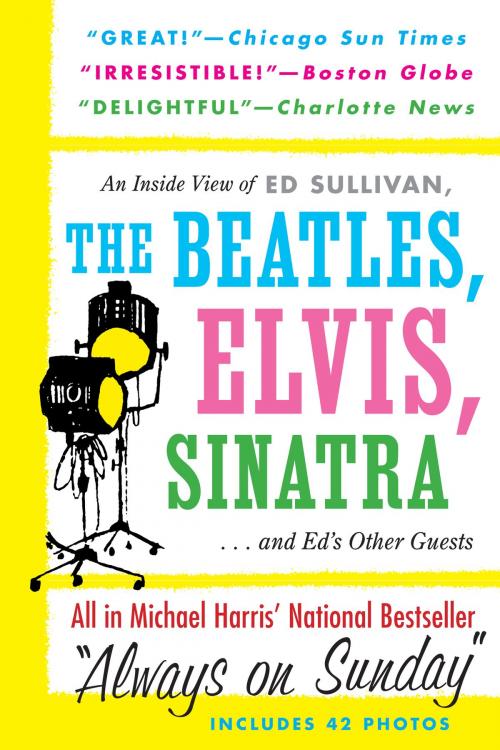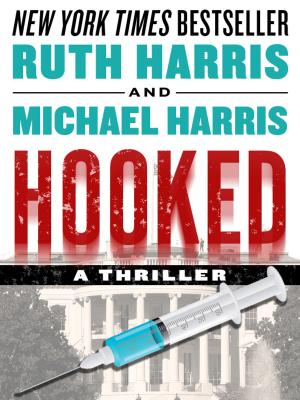Always On Sunday: An Inside View of Ed Sullivan, the Beatles, Elvis, Sinatra & Ed's Other Guests
Nonfiction, Entertainment, Performing Arts, Television, History & Criticism, Biography & Memoir, Entertainment & Performing Arts| Author: | Michael Harris | ISBN: | 1230000119396 |
| Publisher: | Word International | Publication: | April 4, 2013 |
| Imprint: | Language: | English |
| Author: | Michael Harris |
| ISBN: | 1230000119396 |
| Publisher: | Word International |
| Publication: | April 4, 2013 |
| Imprint: | |
| Language: | English |
NEW YORK TIMES BESTSELLER!
How The Beatles Came To America
Famous television Master of Ceremonies, Ed Sullivan first learns I have written a book about him and his show when I hand him a finished manuscript. Naively, I imagine he'll be flattered, but when he reads it, he's furious. I am revealing more about him, more backstage gossip and more details about the inner workings of the show than he wants made public.
Fortunately for me and for Always On Sunday, Ed simmers down. He decides my unauthorized biography is "magnificent" and helps turn the book he initially hated into a national bestseller.
During my 11 years on the Sullivan show, no one created more excitement than the Beatles. February 7, 1964: Their first trip to the United States. The screaming fans! The haircuts! The sassy answers! Welcome to New York! The entire country focuses on this place and these young men. Including me. I am meeting their plane. A CBS public relations executive for years. Now the network's press representative on "The Ed Sullivan Show."
Ed was warned not to sign the Beatles: "You're crazy! No British group has ever made it big in this country." A month before they arrive, they are still unknown in America. Every reporter I contact turns down my invitation to go with me to JFK.
Two weeks later, "I Want To Hold Your Hand" rockets to the top of the charts. Beatlemania crosses the Atlantic, and I am besieged by thousands of ticket requests. Reporters plead to join me at JFK.
On February 14, I greet the Beatles again, this time in Miami for a second Sullivan show. I do my best to stay out of the way but, thanks to papparazzi determined to cash in on every shot of the Fab Four, I appear in photos published around the world (including the NY Post). In the captions I am called a Beatle, a case of mistaken identity I still laugh about with my wife, best-selling novelist Ruth Harris.
When I return to New York, Ed searches for me backstage. One stagehand is impressed. "Ed must really like you," he says. "You've only worked for him for four years, and he already knows your name."
Ed And The Celebrities Who Loved Him -- Or Not!
Why did Frank Sinatra take out an ad saying, "Ed, you're sick, sick, sick."?
You'll find out in Always On Sunday.
Why did Mary Tyler Moore sue "The Ed Sullivan Show"?
You'll find out in Always On Sunday.
Why did CBS cancel Bob Dylan's appearance on "The Ed Sullivan Show" -- against Ed's wishes?
You'll find out in Always On Sunday.
Elvis' fans kissed him where? Ed was stunned when Elvis explained. What did Elvis say?
You'll find out in Always On Sunday
Reviewers Rave!
"One of the most intriguing show business books to come along in a long time. It's great, very well written and tells it like it is. I knew Sullivan for years and consider Harris' book an accurate sketch of a complex man. Well done!"
-- Chicago Sun Times
"Honestly told ...with remarkable frankness and genuine inside knowledge. In the field of show business biographies, Always On Sunday has secured a place on the shelf reserved for the very best."
-- Pittsburgh Post-Gazette
"Always On Sunday: An Inside View..... And it is inside! The book is studded with backstage gossip about showbiz greats."-- Houston Post
"Highly readable and surprisingly candid....A remarkable success story."-- Miami Herald
"Irresistible!"-- Boston Globe
Michael Harris's memoir, The Atomic Times, is based on a more fraught experience: the shocking, funny, sad and raunchy portrait of army life on a nuclear Pacific island in 1955 where troops were used as human guinea pigs during 17 H-bomb tests. (Available on Kobo.)
NEW YORK TIMES BESTSELLER!
How The Beatles Came To America
Famous television Master of Ceremonies, Ed Sullivan first learns I have written a book about him and his show when I hand him a finished manuscript. Naively, I imagine he'll be flattered, but when he reads it, he's furious. I am revealing more about him, more backstage gossip and more details about the inner workings of the show than he wants made public.
Fortunately for me and for Always On Sunday, Ed simmers down. He decides my unauthorized biography is "magnificent" and helps turn the book he initially hated into a national bestseller.
During my 11 years on the Sullivan show, no one created more excitement than the Beatles. February 7, 1964: Their first trip to the United States. The screaming fans! The haircuts! The sassy answers! Welcome to New York! The entire country focuses on this place and these young men. Including me. I am meeting their plane. A CBS public relations executive for years. Now the network's press representative on "The Ed Sullivan Show."
Ed was warned not to sign the Beatles: "You're crazy! No British group has ever made it big in this country." A month before they arrive, they are still unknown in America. Every reporter I contact turns down my invitation to go with me to JFK.
Two weeks later, "I Want To Hold Your Hand" rockets to the top of the charts. Beatlemania crosses the Atlantic, and I am besieged by thousands of ticket requests. Reporters plead to join me at JFK.
On February 14, I greet the Beatles again, this time in Miami for a second Sullivan show. I do my best to stay out of the way but, thanks to papparazzi determined to cash in on every shot of the Fab Four, I appear in photos published around the world (including the NY Post). In the captions I am called a Beatle, a case of mistaken identity I still laugh about with my wife, best-selling novelist Ruth Harris.
When I return to New York, Ed searches for me backstage. One stagehand is impressed. "Ed must really like you," he says. "You've only worked for him for four years, and he already knows your name."
Ed And The Celebrities Who Loved Him -- Or Not!
Why did Frank Sinatra take out an ad saying, "Ed, you're sick, sick, sick."?
You'll find out in Always On Sunday.
Why did Mary Tyler Moore sue "The Ed Sullivan Show"?
You'll find out in Always On Sunday.
Why did CBS cancel Bob Dylan's appearance on "The Ed Sullivan Show" -- against Ed's wishes?
You'll find out in Always On Sunday.
Elvis' fans kissed him where? Ed was stunned when Elvis explained. What did Elvis say?
You'll find out in Always On Sunday
Reviewers Rave!
"One of the most intriguing show business books to come along in a long time. It's great, very well written and tells it like it is. I knew Sullivan for years and consider Harris' book an accurate sketch of a complex man. Well done!"
-- Chicago Sun Times
"Honestly told ...with remarkable frankness and genuine inside knowledge. In the field of show business biographies, Always On Sunday has secured a place on the shelf reserved for the very best."
-- Pittsburgh Post-Gazette
"Always On Sunday: An Inside View..... And it is inside! The book is studded with backstage gossip about showbiz greats."-- Houston Post
"Highly readable and surprisingly candid....A remarkable success story."-- Miami Herald
"Irresistible!"-- Boston Globe
Michael Harris's memoir, The Atomic Times, is based on a more fraught experience: the shocking, funny, sad and raunchy portrait of army life on a nuclear Pacific island in 1955 where troops were used as human guinea pigs during 17 H-bomb tests. (Available on Kobo.)





![Cover of the book Strong, Savvy Women...And The Men Who Love Them, Books 1-3 [Box Set] by Michael Harris](https://www.kuoky.com/images/2017/april/300x300/1230001655407-iN34_300x.jpg)



![Cover of the book THE BEATLES AND THE BOMB [Box Set]: The Atomic Times and Always On Sunday by Michael Harris](https://www.kuoky.com/images/2014/april/300x300/1230000230594-gKGc_300x.jpg)





